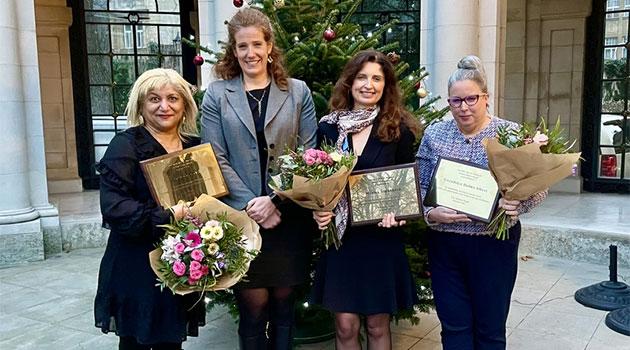US Embassy to the Czech Republic expresses appreciation to activists who fought for compensation for illegally sterilized people

The Alice G. Masaryk Human Rights Award, which the Embassy of the United States of America to the Czech Republic gives out annually, has been given this year to the activists Gwendolyn Albert, Elena Gorolová, and Deputy Public Defender of Rights Monika Šimůnková for their work to secure compensation for the victims of illegal sterilizations. Chargé d’affaires Jennifer Bachus gave them the award on the occasion of International Human Rights Day (10 December), .
The US Embassy announced the decision on its website. The award has been given annually since 2004.
The award expresses appreciation for individuals or organizations that have contributed to enforcing human rights in the Czech Republic. It is named after the founder of the Czechoslovak Red Cross, Alice Garrigue Masaryk, daughter of the first Czechoslovak President, Tomáš Garrigue Masaryk and his American-born wife, the feminist intellectual Charlotte Garrigue Masaryk.
The annual honor is meant to commemorate Alice G. Masaryk’s efforts to achieve social justice and her personal bravery in defending human rights. Bachus expressed the embassy’s appreciation for the many years of initiative on the part of the award-winners in calling for justice and securing compensation for the victims of forcible sterilization.
“You have used your abilities and knowledge to aid some of the most vulnerable members of society, which is a genuinely noble act,” Bachus said. “The Czech Republic adopted the relevant legislation [on compensation] this year, capping the decades of effort made by many people and achieving one of the biggest human rights victories of 2021,” the embassy’s press release states.
According to Albert, who in addition to other activities translates the news for Romea.cz into English, it is important for the majority society to learn what the experiences of the Romani minority have been. “As far as forced sterilizations are concerned, this is a problem that is worldwide. This began for eugenic reasons in the United States and unfortunately continues to this day practically everywhere in the world. I believe we do not yet fully know all that there is to know about where this is happening and where it doesn’t happen,” she told public broadcaster Czech Television.
According to Gorolová, each of the illegally sterilized women whom she knows has a different story, but their common goal has always been to make sure nothing of the sort ever happens again and to achieve compensation. She also said she had lost her strength to go on at a certain moment of the fight and suffered from a mental illness at one point.
The people from the support group for the victims of these abuses helped her to go on, the activist said. “We women experienced humiliation. When we began this fight, society thought we were just Romani women who wanted money and that was why we were fighting. Many other criticisms of us were expressed. We told each other that we would not listen to them and keep going,” Gorolová told Czech Television.
Suspicions of forced sterilizations in the Czech Republic, above all of Romani women, were raised most recently in the year 2004 by the European Roma Rights Centre (ERRC). Dozens of women then applied to the Czech ombudsman and some also turned to the courts.
The Czech Government Committee against Torture proposed introducing compensation in 2006. In 2009 the Government expressed regret for the illegal interventions.
The Czech Republic has been criticized for years over the fact that the state violated people’s rights without then compensating them. The law on compensation was adopted by Parliament this year and signed into law by the President.
The victims of illegal sterilizations performed between July 1966 and the end of March 2012, if able to prove their claims, will be awarded CZK 300 000 [EUR 12 000]. In recent years the US Embassy to the Czech Republic has given the Alice G. Masaryk Human Rights Award to former ombudswoman Anna Šabatová, advocate for LGBT rights Czeslaw Walek, the head of the Committee for the Redress of the Roma Holocaust Čeněk Růžička, the weekly magazine RESPEKT, or the head of the organization People in Need, Šimon Pánek.
